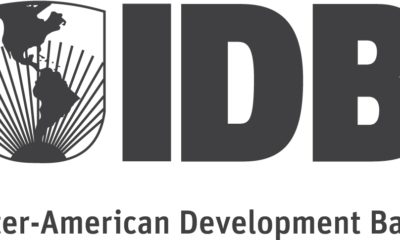Roadmap for new, 21st-century business model will enable Bank to expand ambitious, business-friendly climate action, protect biodiversity, increase green finance, and better advance gender equality
New business model goes hand-in-hand with the mandated path for a capital-increase proposal for IDB Invest that will allow the Bank’s private-sector arm to be more responsive to the region’s needs, dramatically scale up private sector investment and boost creation of formal jobs, the details of which will be presented to the Boards of Executive Directors in September
Approval of a new value proposition for the Bank will empower it to better address social issues, strengthen the private sector and combat climate change
WASHINGTON – The Boards of Governors of the Inter-American Development Bank (IDB) and IDB Invest today approved a roadmap for a series of institutional reforms for the IDB and mandated a proposal for a capital increase for IDB Invest, the Bank’s private-sector arm.
The Governors’ actions will modernize the IDB, IDB Invest and IDB Lab, our innovation laboratory, ushering in a new, 21st-century business model that will help countries across Latin America and the Caribbean more effectively address challenges, including poverty and inequality, climate change and the need for digitalization.
The proposed reforms will empower the Bank to accelerate inclusive and sustainable growth by strengthening the synergies between the public and private sectors, ensuring equal opportunities for women in areas including education, business and justice, and doing more to help countries reach net-zero-emissions targets.
“Our record year in 2021 proved how the IDB can optimize its balance sheet and mobilize resources, but the new IDB can do even better. This is a historic moment for the IDB and IDB Invest. The Boards’ actions mean we are gaining the muscle, flexibility and tools needed to support the urgent needs of Latin America and the Caribbean in the 21st century,” said IDB President Mauricio Claver-Carone at the Bank’s annual meeting.
“The pandemic hit our most vulnerable citizens hard. Now the region faces rising inflation, higher global interest rates, and shifting geo-economic and geopolitical concerns. We rose to the occasion in 2020 and 2021, but we can now do even more by leveraging our strengths. Thanks to the Governors’ actions, we are now empowered to better help the region by mobilizing more private-sector resources and doing more in critical areas such as climate change and gender equality,” he said.
IDB Invest 2.0
The new business model envisioned for IDB Invest, or IDB Invest 2.0, which will be developed over the next six months and submitted to the Boards for approval this fall. The approval to advance with the new vision signifies confidence in IDB Invest’s ability to develop an even more impactful approach to development. The new model will allow it to scale up work with investors and companies throughout the region. IDB Invest’s innovative, new approach will focus on originating more impactful projects, de-risking private-sector investment, and using new financial and technical tools, to help crowd-in investment. The new business model goes hand-in-hand with the mandate for a capital increase proposal for IDB Invest, the details of which will be presented to the Boards of Executive Directors this fall.
These new capacities will help IDB Invest build on the record level of mobilizations it achieved in 2021 and enhance its role as the region’s foremost private-sector-mobilization partner for development. A more ambitious IDB Invest will work even closer with the IDB, which will also have new tools to creatively collaborate with, and support, borrowing member countries to enable business environments that attract investment and are more conducive to job-creation.
The IDB’s New Value Proposition
Reforms at IDB and IDB Invest form part of a new value proposition for the institutions, and IDB Lab, approved by the Governors that will enable the Bank to accelerate regional development by better addressing social challenges, strengthening the private sector and more ambitiously combatting climate change.
New business models at the IDB and IDB Invest will allow them to take a more sophisticated approach to collaboration. The IDB will act as a hub, linking the private-sector work of IDB Invest with partnerships and projects on the public-sector side. This will enable the Bank to better leverage trillions of dollars in private-sector assets that the region must access to successfully combat climate change.
This 21st-century business model will help the IDB promote reforms to improve social protection and health, inclusion, labor markets climate action and gender equality. It will also help the IDB work better with governments to correct market failures and structural bottlenecks that today prevent investment, improve institutions, strengthen the rule of law, and improve the business climate. This dovetails with IDB’s Invest new focus on originating socially impactful projects, de-risking them and offering them to institutional investors.
The new approach also calls for transitioning IDB Lab from an innovation lab to an innovation hub, allowing it to do more to scale up the impact of private-sector projects and leverage its capacity to take on risk to do experimental work in frontier sectors and invest in early-stage projects. IDB Lab’s agility and ability to respond rapidly to clients’ needs will enhance the Bank’s capacity to test innovative ideas and carry out pilot programs that can be expanded to meet regional development goals.
The Governors’ endorsement will make the IDB more innovative and responsive, with enhancements to project design, a new Comprehensive Portfolio Management System to measure and achieve results, and updated financial and technical instruments. This will lead to more effective support for government reforms, new contingent and rapid-disbursement facilities, more innovative climate-change instruments, increased execution capacity for counterparts, and risk-appetite and equity-investment policies that will favor private-sector projects and operations.
Combined, these new approaches, along with plans to more ambitiously tackle climate change and gender inequality, will help the region meet its evolving development needs, while helping to reduce poverty and protect its most vulnerable people.
The actions by the Boards of Governors stem from a mandate issued at the 2021 Annual Meeting for the Bank to carry out an in-depth analysis of the region’s challenges and the Bank’s role and optimal institutional structure. Following a period of consultations with country authorities and other stakeholders, the Bank presented Governors with a new value proposition centered on its core mandate of ensuring development effectiveness.
“I am immensely proud of the analytical work done by our experts, and I thank our Boards of Governors and our Executive Directors for their overwhelming support,” President Claver-Carone said. “This is not the destination, but truly the beginning of our journey to help our member countries, as we make the IDB the gold standard of operational excellence. Our region deserves no less.”
The next Annual Meeting of the IDB and IDB Invest will take place in Panama.
Regional Background
Even before the pandemic, Latin America and the Caribbean faced significant socioeconomic challenges, including some of the world’s slowest growth rates, high levels of labor informality, rising social discontent, poverty that reached nearly a third of the population, and big gaps in infrastructure, digitalization and small business financing.
The pandemic threw millions of people into poverty and set back a decade of gains in equality, particularly for women. In addition, the region suffered its worst economic collapse in 200 years in 2020 and, initially, had the world’s highest COVID-19 fatality rates.
In 2021, the region defied expectations and posted one of the world’s fastest economic recoveries. However, the recovery has not been accompanied by proportionate improvements in the job market or in key socioeconomic indicators. That is particularly true for women, who lost more jobs than men and are struggling to reenter the labor market. The region is also still reeling from the world’s longest school closures – an average of 231 days – and millions of children in the region have yet to return to classrooms.
About the IDB
The Inter-American Development Bank is devoted to improving lives. Established in 1959, the IDB is a leading source of long-term financing for economic, social, and institutional development in Latin America and the Caribbean. The IDB also conducts cutting-edge research and provides policy advice, technical assistance, and training to public and private sector clients throughout the region.
About IDB Invest
IDB Invest, a member of the IDB Group, is a multilateral development bank committed to promoting the economic development of its member countries in Latin America and the Caribbean through the private sector. IDB Invest finances sustainable companies and projects to achieve financial results and maximize economic, social, and environmental development in the region. With a portfolio of $14.8 billion in asset management and 376 clients in 25 countries, IDB Invest provides innovative financial solutions and advisory services that meet the needs of its clients in a variety of industries. IDB Invest’s legal name is the Inter-American Investment Corporation.
About IDB Lab
IDB Lab is the IDB’s innovation laboratory, promoting development through the private sector by identifying, supporting, testing and piloting new solutions to challenges and seeking to create opportunities for poor and vulnerable populations in Latin America and the Caribbean. www.idblab.org


 Businessuite Markets2 weeks ago
Businessuite Markets2 weeks ago
 Businessuite Markets4 weeks ago
Businessuite Markets4 weeks ago
 Logistics & Transportation4 weeks ago
Logistics & Transportation4 weeks ago
 Leadership Conversations3 weeks ago
Leadership Conversations3 weeks ago
 Businessuite Markets4 weeks ago
Businessuite Markets4 weeks ago
 Businessuite Women4 days ago
Businessuite Women4 days ago
 Businessuite Markets4 weeks ago
Businessuite Markets4 weeks ago
 Business Insights2 weeks ago
Business Insights2 weeks ago
























